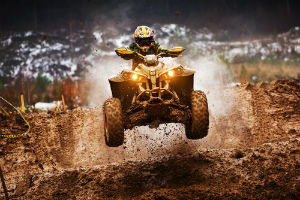- ATV accidents
- Brain Injuries
- Bus Accident
- Car Accidents
- Construction Accident
- Distracted Driving
- Drugged Driving Accident
- DUI
- Firm News
- Mass Tort
- Medical Malpractice
- Motorcycle Accidents
- Pedestrian Accidents
- Personal Injury
- Product Liability
- Safety
- Social Security Disability
- Truck Accidents
- Vehicle Accidents
- Workers Compensation
- Workplace Injuries

For more information visit our page Lexington ATV accident lawyer.
All-terrain vehicles are a popular way for adventure seekers to explore some of Kentucky’s most beautiful areas. But ATVs have a long history of safety problems in the U.S., and the Bluegrass State is no exception. In fact, the state ranks in the Top Five across the nation for the number of people who are killed each year in ATV accidents.
A recently released report from the Consumer Product Safety Commission shows more than 13,000 people were killed in ATV wrecks between 1982 and 2013. Of that number, 595 deaths occurred in Kentucky.
For the 2010-2013 period, Kentucky ranked third in the nation in ATV fatalities behind only Texas and West Virginia. Kentucky reported 116 deaths in ATV accidents during the period based on preliminary reporting. The CPSC expects the numbers to increase.
Any death is a tragedy, but ATV accidents are particularly sobering because a significant percentage of fatalities and injuries involve children. According to the CPSC analysis, 23 percent of ATV deaths between 1982 and 2013 were 16 years old or younger. More than 1,000 of those children were younger than 12, according to the report.
ATVs Have an Inconsistent Track Record for Safety
All-terrain vehicles have had their fair share of safety concerns from consumers and federal regulators. In the 1980s, the Justice Department and CPSC sued the manufacturers of three-wheeled ATVs, citing the high number of accidents involving those models. They prevailed in court, and now the majority of ATVs are more stable four-wheelers.
But there are still a number of factors that make ATVs a cause for concern. Like motorcycles and bikes, these vehicles can provide only a limited amount of physical protection to riders and passengers. In a collision with a tree or rollover accident, their bodies will be directly exposed to the crash site – which inevitably means at least a few scratches and bruises, if not worse.
In a somewhat bright spot of news, the CPSC report did say that 85 percent of emergency department-treated injuries were treated and released.
But the worst-case scenarios are brutal. While many injuries in ATV accidents involve lacerations and sprains/strains, some of the most common injuries are also organ damage and concussions. Even though many people think a concussion is a simple bump to the head, it is actually a brain injury and can have lasting impact on a person’s physical and mental capacities.
Tips on ATV Safety
There is no foolproof way to prevent ATV accidents. But there are plenty of measures that you can take to lessen the likelihood of a serious injury, including:
Wearing an approved helmet: It should be approved by the U.S. Department of Transportation, American National Standards Institute or Snell Memorial Foundation.
- Wear it responsibly: Always buckle the chin strap so the helmet won’t fall off in a crash. You should also replace it every five years or sooner if there is a chip or crack in it.
- Wear safety gear: Gloves, protective clothing, goggles or a face shield are essential.
- Get proper training: Operating an ATV involves understanding how the vehicle will maneuver and how you must move your body to stabilize the vehicle through turns and difficult terrain. There are a variety of places throughout Kentucky where you can sign up for training.
- Take Care of Your ATV: It’s not a toy. Get it properly maintained per your owner’s manual.
- Stay off Paved Roads: ATVs are off-road vehicles, and Kentucky law states that almost all operators must stay on unpaved trails. ATVs are not designed for paved travel, yet a study from the Insurance Institute for Highway Safety recently found that Kentucky had the highest number of ATV accidents on paved roads in the country.
- Obey Laws on ATV Size: Children under 16 cannot operate a vehicle with engines under 90 cubic centimeters and must be supervised by a parent at all times. Those under 12 cannot drive ATVs with engines over 70 cubic centimeters.
- Single Riders Must Stay Single: An ATV built for one rider should not carry a passenger.
With proper precautions and care, an ATV can be a great form of recreation for adults and children alike. As we head into summer, please ensure that you have taken all steps to have a happy and healthy riding season.

